#Unlike Venezuelan politics
Text
Lula's South American summit plan unlikely in tense region, diplomats say
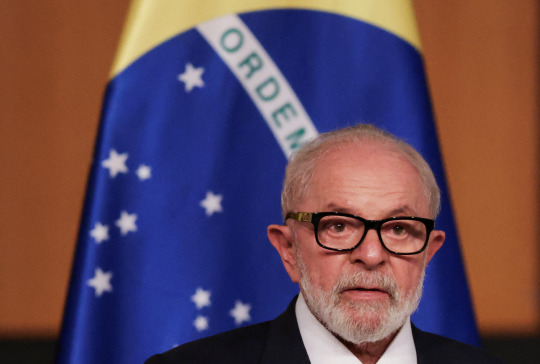
A diplomatic crisis in Ecuador and uncertainty over Venezuela's political future have divided South American nations and killed enthusiasm for a summit that Brazilian President Luiz Inacio Lula da Silva is trying to convene, diplomats in the region say.
Seeking to become a regional leader again, Lula gathered 11 presidents in Brazil's capital last May, but the forum called the Brasilia Consensus was struck by disagreement over the presence of Venezuela's authoritarian President Nicolas Maduro.
Chilean President Gabriel Boric, a fellow leftist from a younger generation, criticized Lula for inviting Maduro to a meeting of democratic leaders, as did Uruguayan President Luis Lacalle Pou.
With concerns about Venezuelan elections in July and fallout from Ecuador's invasion of the Mexican embassy to seize an opposition politician, the region is too unsettled for a fresh attempt at dialogue, diplomats in Brazil and Uruguay said.
Continue reading.
#brazil#brazilian politics#politics#foreign policy#international politics#mod nise da silveira#image description in alt
79 notes
·
View notes
Text
With Luiz Inácio Lula da Silva returning to Brazil’s presidency after his narrow victory over Jair Bolsonaro in the country’s Oct. 30 election, left-of-center leaders will now be governing a majority of Latin American countries, including all the most populous states. The trend, widely described as a new “pink tide” by the media, inspires cheer among progressives in the United States and around the world. Given Washington’s legacy in the region, it’s understandable for there to be mutual suspicion between Latin America’s new left and the United States. But unlike in the past, their interests are aligned in many ways today, presenting a unique opportunity for cooperation.
This is not the first time left-of-center leaders have swept to power across much of Latin America. Sixteen years ago, Mexican political scientist Jorge Castañeda wrote about “Latin America’s Left Turn” after left parties had taken power across much of the region—including Lula and his Workers’ Party. With the term “left” covering a huge spectrum of Latin American politics, the idea was as fraught then as it is now. Castañeda sought to differentiate between the “good” left (moderate, democratic) and the “bad” left (radical, authoritarian). At the time, it was a message to Washington that it could still have partners in the region despite a long and troubled history of U.S. interference.
Lula, as he is widely known, will rule alongside a few leaders who were in power during the previous pink tide, including some on Castañeda’s “bad” side. Some of them, like Lula, are back in power (Argentine Vice President Cristina Fernández de Kirchner, widely seen as calling the shots), or they never left (Nicaraguan President Daniel Ortega). Others continue to rule from behind the scenes (former Bolivian President Evo Morales) or seemingly from beyond the grave (Cuban leader Fidel Castro and Venezuelan President Hugo Chávez).
Castañeda’s simple categories of good and bad leftists were far too simplistic, but they had a certain logic in translating the region’s complexities for the George W. Bush administration, which pigeonholed countries as either “with us or against us.” Today, the Biden administration has a more nuanced understanding of the region and has experience dealing with many of the figures. But the region is different today, as are the voters, parties, and politicians—even the holdovers from the last left turn. Washington should therefore avoid the pitfall of viewing the region through the prism of the first pink tide or outdated political categories.
Left-right classifications are everywhere increasingly muddled as leaders make political alliances based less on ideology than on political expediency. But they have long been a hard fit in Latin America, not least because of the region’s long history of ideologically fluid nationalist populism, from Peronism in Argentina to Mexico’s long-ruling Institutional Revolutionary Party. How should one classify Nicaragua’s Ortega, who rules under the banner of a left party that he has purged of leftists and whose regime has among the harshest anti-abortion and most investor-friendly laws in the region? Or Salvadoran President Nayib Bukele, the self-described “coolest dictator in the world,” who broke with a leftist party to run for president with a right-wing one and whose allies include criminal gangs and bitcoin speculators?
Seeing a resurgence of the left also conflates cause with effect. It is less a turn to the left than a turn against incumbents, most of whom happened to have been on the right. Right-of-center governments ruled during the COVID-19 pandemic and subsequent economic crisis, and most failed catastrophically. Bolsonaro’s loss in Brazil, where 688,000 people died of the disease, marks the 15th national election in a row in which the incumbent party was swept from the presidency. That, of course, can happen only in democracies; Latin America’s left turn would not be nearly as uniform if Cuba, Nicaragua, and Venezuela had truly competitive multiparty elections.
Unlike in the 2000s, there is no unifying ideological project for the current left turn. Then, Venezuela’s lavish oil rents fueled Chávez’s vision, under the banner of anti-imperialism, of a Bolivarian Alliance, a Bank of the South, and other regionwide integration projects. Today, Venezuela is broke, intraregional trade is on the decline, and new governments are too busy trying to hold on to power as they face hostile opposition legislatures and the crises inherited from their predecessors. The 2000s pink tide was sustained by an unprecedented boom in commodity prices brought on by China’s growth, which produced a gold rush in copper, iron ore, soybeans, and hydrocarbons, allowing state oil companies to subsidize lavish social spending. Today’s left turn has no such favorable market climate and instead comes amid rising inflation. As governments from Chile to Haiti have learned, protests over rising transportation costs easily spiral into much bigger problems for any government, no matter its political orientation.
Today’s left turn is precarious. The narrow margins of victory for many of the new left governments—only 2 percentage points in Brazil, 3 percentage points in Colombia—underscore the resilience of Latin America’s right, particularly among social conservatives and the growing number of evangelical Christians. Left-wing leaders who once took office with strong mandates have seen them evaporate; Chilean President Gabriel Boric, who won with 56 percent of the vote, now has a mere 27 percent approval rating. Others face a right opposition that is committed to using any means necessary to take back power. Peru’s leftist president, Pedro Castillo, has been in office just over a year and has already faced two impeachments. He may not survive much longer.
Given the checkered history of U.S.-Latin American relations, it is natural for progressives throughout the Western Hemisphere to fear covert or overt interference by Washington to secure friendly governments. The problem with this view is that it denies agency to Latin American countries, seeing them only as objects of U.S. policy. It also obviates the need to understand how each country’s domestic dynamics have driven voters’ rejection of right-wing incumbents: a corrupt narcostate in Honduras, a failed neoliberal education system in Chile, a hated cult of former strongman Alberto Fujimori in Peru. Those who look only at the past might also keep in mind that countries in the region almost universally express a desire for more U.S. engagement, not less. They just want it to be on fair and equal terms.
It’s also imperative to understand how regional dynamics have changed since the Bush administration and prior U.S. governments. Rather than hostile, Washington has been cautiously supportive of the new left governments. In Brazil, the Biden administration rushed to congratulate Lula moments after the results were announced. The call capped months of coordinated efforts to stave off a potential coup by Bolsonaro’s military allies, including warnings from U.S. Sen. Bernie Sanders and the CIA. U.S. Secretary of State Antony Blinken recently toured Chile, Peru, and Colombia, whose governments are not merely center-left but socialist. New Honduran President Xiomara Castro, a self-described democratic socialist, received a succession of U.S. delegations, including Vice President Kamala Harris and the chief of the U.S. Agency for International Development, Samantha Power.
In part, Washington’s accommodating attitude is a recognition of the far weaker position it now occupies in the region. China is already the top trade partner to the largest South American economies, though the United States still leads with Mexico and much of Central America and the Caribbean, not least because of geographical proximity. The loss of U.S. economic hegemony was most starkly—and embarrassingly—on display at June’s Summit of the Americas in Los Angeles, where the United States faced a boycott by Mexico, Bolivia, El Salvador, Guatemala, and Honduras. The action was ostensibly to protest the United States disinviting Cuba, Venezuela, and Nicaragua from the summit over their authoritarian records, but it soon encompassed a laundry list of complaints of U.S. pressure. The noninclusion of Cuba has increasingly become a point of contention within the Organization of American States.
Washington has also found shared interests in climate policy with the newer generation of leftist leaders, notably Colombian President Gustavo Petro, who recognize the unsustainability of an economic model based on resource extraction, whose profits buttressed the first pink tide. Washington’s outreach to new left governments in the region—including those whose stances on Venezuela and Russia conflict directly with U.S. policy—demonstrates a belated recognition that the United States can’t afford to place ideological conditions on engagement. And while much of Washington’s Latin America policy has been distorted by the bizarre politics of South Florida, that state’s transition to a solidly Republican state—as well as Joe Biden’s 2020 presidential win without it—opens a window for new approaches to the region by the Biden administration.
The new left turn is thus a moment of opportunity both for the left and for Washington—one that might not last long. The United States is at once less hegemonic, more open to negotiation, and more idealistic about rights and governance in the region. Recent measures to lift restrictions on travel and remittances to Cuba and moves toward sanctions relief for Venezuela show that there is space to push for less confrontational policies. New left governments are vulnerable and need both economic and political support. Smart leaders will find ways to play the United States against China, as Costa Rica and Ecuador have done. They will also recognize that Washington wants and needs partners in the region. And following the Jan. 6, 2021, insurrection in Washington, there is growing awareness of the shared threat posed by the global authoritarian axis and a recognition that for safeguarding democratic institutions, the left, on balance, may be a better bet.
2 notes
·
View notes
Text
Why People Are Deciding on to Live and Retire in Costa Rica
Costa Rica is a place of stunning scenery, sunshine and even smiles with spring-like weather all year round, no revenue taxes on foreign earned income, simply no capital gains income taxes, excellent world-class clinical facilities, affordable professional medical plans and populated by the 'Ticos' who will be an bienveillant and intensely attractive people.
Who will be Moving to Costa Rica? There happen to be estimated to become seventy seven million 'baby boomers' in the USA who began retiring in 2008 and even it seems there is quite a few considering a BahÃa Rica retirement. Consequently too are Canadians and numerous Europeans that are looking regarding that perfect environment and an even more affordable location to are living.
Wealthier people coming from all over Key and Latin The united states are also visiting Costa Rica because of political and financial instability inside their personal countries.
When you dread for the lifestyles of your personal children because they may well be kidnapped inside Mexico, Guatemala or even Honduras or, you have just witnessed the value of your home cut in half as many of our Venezuelan friends have just lately, your future may look downright terrifying.
Politically Stable Region: Unlike most nations in Central plus Latin America, Puerto Rica has been a stable plus democratic country since it's independence throughout 1948. It includes no army, and its residents enjoy one of many highest life expectancy levels in the American hemisphere and better living standards than their war-torn neighborhood friends.
Costa Rica's excellent climate, laid back lifestyle, financial plus political stability can make this 'rich coast' look like heaven that is known to numerous people.
Online business offerings: Is actually not just individuals seeking retirement which are visiting Costa Natural. We have been seeing youthful entrepreneurs coming to be able to Costa Rica using dreams of building their business here.
It is really an admirable objective however; we ought to remember that possessing a working knowledge involving Spanish will only take you 50 percent way. We have to remember that we are usually guests in their very own country, doing business here can be tough because inefficient bureaucracies, redundancies and duplications are part of everyday business.
Inexpensive Panama and nicaragua , Real House: In comparison along with Europe and numerous metropolitan areas in america, real estate throughout Panama and nicaragua , is very cost-effective. Foreigners can very easily buy their particular properties and a several individuals have decided in order to build their own residences.
According to typically the Global Property Guide, the cheapest city throughout Europe is Bucharest to would shell out US$3, 085 per square meter regarding a 120M2 house (1, 291. 2 square feet). And so most Costa Rica actual estate is 40-50% less than the particular cheapest city in Europe.
You could certainly find luxury condo properties in Costa Rica intended for $2, 200 for each square meter nevertheless you can in addition easily buy a new modern, completely new, extremely comfortable home anyplace near the organization, cultural and amusement centre of San Jose, the funds of Costa Sana for US$1, five-hundred - $1, 750 per square m. I know this kind of because I have got bought a few homes here.
As a great example, in 2007 I bought a new, two history 300M2 (3, 228 square feet) luxurious home (350M great deal - 3, 766 square feet) in a secure gated condo community within a great location within Santa Ana, constructed by one involving the best constructors we have come across costing US$1, 033 per pillow meter.
Property Taxes: When buying a residence in Costa Natural, property taxes should be considered yet thankfully there exists tiny to worry about because basic property taxes are just 0. 25% and even if the home is ultra-luxurious plus the luxury home tax also is applicable, everything adds up to very tiny..
Based on the Miami Dade County website, on an US$275K home in Miami, a person would pay regarding US$6, 875 per year in property income taxes. With a high-class apartment in, typically the property taxes regarding a home of the same value would end up being below $1, 500 per year so you would save about US $490 per month just in real estate taxes.
And regarding read more , 228 sq ft luxury residence in Costa Natural? I paid about $230 per month for both monthly upkeep (swimming pool, landscaping design, security etc) just as well as house taxes.
Building Your Own Home:
In late July 2009 all of us finished building our own 1, 797 square feet retirement home (plus 462. 68 sq ft for the garage area area, pila in addition to bodega) on your five, 000M2 of property and fully furnished it for much less than US$140, 000
Building your have home is not intended for the faint involving heart anywhere in the world yet if you are comfortable with the concept then you'll always be delighted to understand that your toil costs in are low.
Affordable Cost of Living: Simply 1% of US ALL households headed simply by folks aged 62-72 have $1,000,000 or perhaps more in possessions other than their own home. Seeing that may sound like a bundle but $1M today lasts less as compared to two decades assuming a rate of go back of 7%, inflation of 3% and inflation-adjusted annual withdrawals of $75K. People understand that their money will last some sort of lot longer which has a Costa Rica retirement living.
With that said, demographically talking, forty-six percent regarding the middle-agers are continue to in their 40s so there are plenty of baby-boomers that haven't really started to believe about their pension. The more unfavorable the political in addition to economic environment will become in america, the more receptive they are to be able to the idea of living and retiring abroad.
How Very much Is The Foods? To provide you with a genuine idea about foods costs, in a single involving Jo Stuart's recent newspaper columns, the girl compared the actual price of a basket of fruits in addition to vegetables purchased right here in to typically the exact items acquired in a California farmer's market. She invested US$8. 75 right here as well as the same products in California price US$29. 47
The bottom line is should you eat the healthy diet full of fresh fruit, new vegetables, a little seafood, chicken or beef, you and the family will probably be much healthier and you'll appreciate significant savings upon food living in Costa Rica.
But, in case you prefer to consume highly-processed, imported foodstuff, you are planning to pay through the nose with regard to it and you are not necessarily going to always be healthy.
Heating Costs: Who needs heat? Unless you live at fairly large altitudes, you would likely not really think concerning heating... In over seven a lot of residing here, I use just ever been in a single home that had an in-floor heating method installed.
Water: Fortunately Panama and nicaragua , gets a lot of water. In some of the Northern Guanacaste locations there is certainly a water management problem mostly due to over growth along with a lack regarding infrastructure but many of us do have a good amount of water.
Electricity: An important amount of Puerto Rica's electrical power needs are renewable, met by geothermal (volcanic) and hydro-electric power. Thus, that is fairly properly insulated against olive oil price fluctuations and is also able to maintain relatively cheap electrical power price levels that will be almost the cheapest found in the Americas. Telephone costs are in addition really low.
Obviously in the event that you live with the beach wherever it really is much steamy then air health is essential for many people. This would boost your basic charges however, around the particular Central Valley area, you do certainly not need heating plus hardly anybody ever before uses air conditioning.
Cars in Costa Rica Usually are Expensive: If an individual don't get a property (at least immediately), buying an automobile will be your biggest outlay - new cars could be over some sort of third more within price in comparison to costs in the U. S.
Life Enriching Experience: Learning a new language is the rewarding and improving experience and assists keep you along with your brain alive. Turning out to be familiar with typically the culture and practices of any new guys can be exhilarating and we've run into dozens of people young and old who came in this article single and therefore are now very happily married.
I actually personally believe Costa Rica has the many perfect climate for the human physique and am love the people - the particular 'Ticos. ' They will are still people with the same hopes and fears as you and I plus there are excellent ones and negative ones....
For us to enjoy the particular same kind of extremely comfortable way of life that I love in Costa Natural in a major ALL OF US or European city, I would (and I actually is NOT exaggerating) need to earn at least 5 times a lot more than I actually is earning today...
Living in Costa Rica is just not with regard to everyone, the guys can be a little too 'laid back' with regard to you but after living in ten countries and visiting many others, I actually honestly believe these people are between the nicest people I've come across and definitely amongst the many physically attractive men and women on the planet...
http://www.WeLoveCostaRica.com
Martin Oliver is the Founder of WeLoveCostaRica. com, home associated with stunning scenery, sunshine & smiles. Martin is the creator of "Costa Sana Real Estate Hoaxes & How To be able to Avoid Them", "How To Buy BahÃa Rica Property With out Losing Your Camisa" & "Costa Rica's Guide To Making Money Offshore inside Bull & Bear Markets". Get a free 'Costa Rica Surviving & Retirement Insider's Guide' at
3 notes
·
View notes
Text
Latin America’s New Hard Right: Bukele, Milei, Kast And Bolsonaro! Crime, Abortion and Socialism, Not Immigration, Are The Issues That Rile Them
— April 1st 2024| Santiago, Chile 🇨🇱

A montage of right-wing Latin American leaders on a red and blue background with Donald Trump throwing maga hats at them. Illustration: Klawe Rzeczy
“Mr president!” Javier Milei could barely contain himself when he met Donald Trump at the Conservative Political Action Conference (CPAC) near Washington in February. The pair embraced and exchanged slogans, with Mr Trump intoning “Make Argentina Great Again” several times and Argentina’s new President yipping “Viva la Libertad, Carajo” (“Long Live Freedom, Dammit”) in response.
Nayib Bukele, El Salvador’s Popular Autocratic President, had already addressed the conference. “They say globalism comes to die at CPAC,” he told enraptured Republicans. “I’m here to tell you that in El Salvador, it’s already dead.” Jair Bolsonaro, Brazil’s Hard-Right Former President, was a star guest in 2023. He, like Mr Trump, claimed without evidence that his bid for a second term was thwarted by fraud. His supporters also attempted an insurrection.
These scenes suggest a seamless international alliance between Mr Trump and the leaders of Latin America’s hard right. Its members also include José Antonio Kast of Chile, who has spoken at cpac in the past too. This new right basks in Mr Trump’s influence. It has turned away from a more consensual form of conservative politics in favour of an aggressive pursuit of culture war.
Its ascent began with the surprise victory of Mr Bolsonaro in Brazil in 2018, followed by that of Mr Bukele in 2019. In Chile Mr Kast, the founder of a new hard-right Republican Party, got 44% of the vote in a presidential run-off in 2021 and his party won an election for a constitutional council in 2023. Mr Milei won his own surprise victory in November. Would-be leaders of the radical right jostle in the Politics of Peru and Colombia.
Unlike its older European and North American equivalents, the Latin American hard right does not have roots in the fertile soil of public anxiety about uncontrolled immigration (although this has become an issue recently because of the arrival of millions of Venezuelans fleeing their country’s rotten dictatorship).
The new group shares three hallmarks. The first is fierce opposition to abortion, and gay and women’s rights. “What unites them is an affirmation of traditional social hierarchies,” as Lindsay Mayka and Amy Erica Smith, two academics, put it. The second hallmark is a tough line on crime and citizens’ security. And the third is uncompromising opposition to social democracy, let alone communism, which leads some to want a smaller state.
There were common factors in their ascents, too. They were helped by a sense of crisis—about corruption and economic stagnation in Brazil and Argentina, gang violence in El Salvador and the sometimes violent “social explosion” in Chile.
Cousins In Arms
But each leader has adopted a different mix of these ideological elements. The hard right in Latin America are “cousins, not brothers”, says Cristóbal Rovira of the Catholic University of Chile. “They are similar but not identical.”
Mr Bolsonaro’s constituencies were evangelicals, to whom he appealed with his defence of the traditional family, and the authoritarian right in the form of the army, the police and farmers worried about land invasions and rural crime. But he was lukewarm about the free market and fiscal rigour. Mr Bukele made security the cornerstone of his first presidential term, overcoming criminal gangs by locking up more than 74,000 of El Salvador’s 6.4 Million Citizens. His economic policy is less clear and, despite his claim at CPAC, is not self-evidently “anti-globalist”.
Mr Milei was elected for his pledge to pull Argentina out of prolonged stagflation and to cut down what he brands as a corrupt political “caste”. A self-described “anarcho-capitalist”, he is a fan of the Austrian school of free-market economics. Unlike Mr Trump, he is neither an economic nationalist nor protectionist on trade. He has only recently adopted his peers’ stance on moral issues. His government supports a bill to overturn Argentina’s abortion law, and says it will eliminate gender-conscious language from public administration. Mr Bukele followed suit.
Mr Kast attempted to put conservative morality in the constitutional draft his party championed, which was one reason why it was rejected in a plebiscite. He wants tough policies on security and against immigration. “We should close the borders and build a trench,” he says. He wants to “shrink the state and lower the tax burden”. Whereas Mr Bolsonaro is a climate-change sceptic and anti-vaxxer, Mr Kast is not.
Democracy For Thee, Not For Me
Right-wing populists also have differing attitudes to democracy. With his attempt to subvert the election result, for which he is under police investigation, Mr Bolsonaro showed that he was not a democrat. Mr Bukele is contemptuous of checks and balances. His success at slashing the murder rate made him hugely popular, allowing him to brush aside constitutional term limits and win a second term in February.
Mr Milei’s “disdain for democratic institutions is clear”, says Carlos Malamud, An Argentine Historian, citing Mr Milei’s break with convention by giving his inauguration speech to a crowd of supporters, rather than to Congress. But, Mr Malamud adds, Mr Milei may yet learn that he needs to include the parliament in government.
“I’m a democrat,” insists Mr Kast, and his opponents agree. “On security and shrinking the state, we share views with Bolsonaro,” he says. “But that doesn’t mean that we are the same as Milei or Bolsonaro or Bukele.” As Mr Kast notes, policy choices are shaped in each country by very different circumstances.
So are the prospects of the various leaders. Mr Bukele is by far the most successful, with would-be imitators across the region and no obvious obstacles to his remaining in power indefinitely. In contrast, Mr Bolsonaro’s active political career may well be over. The electoral court has barred him as a candidate until 2030 (when he will be 75) for disparaging the voting system at a meeting with foreign ambassadors. He may be jailed for his apparent attempt to organise a military coup against his electoral defeat; he denies this and claims he is a victim of political persecution.
Mr Milei’s future is up for grabs. Succeed in taming inflation, and he could emerge strengthened from a midterm election in 2025. But if he refuses to compromise with Congress and provincial governors, he may be in trouble before then. In Chile, Mr Kast seemed to overplay his hand with the constitutional draft. The election in 2025 could see the centre-right take power. One influential figure of that persuasion argues that Mr Kast is unable to represent the diversity of modern Chile.
Ultimately, the group is bound by an international network built around common political discourse and cultural references. Mr Kast chairs the Political Network for Values, an outfit previously led by an ally of Viktor Orban, Hungary’s Populist Leader. Vox, Spain’s hard-right party, organises the Foro de Madrid, a network of like-minded politicians mainly from what it calls the “Iberosphere” in Latin America.
These gatherings offer a chance to share experiences and sometimes a bit more. Mr Bukele has advisers from Venezuela’s exiled opposition. Mr Trump’s activists have shown up at Latin American elections. Recently, Mr Bolsonaro took refuge in the Hungarian embassy in Brasília for two nights when he feared arrest.
But there are no signs of central direction or co-ordination. The right in Latin America has long claimed that the Foro de São Paulo, a get-together of Latin American left-wingers, is a highly organised conspiracy. All the evidence is that it is a loose friendship network. That seems to be true of its right-wing peer, too. ■
— This article appeared in the The Americas section of the print edition under the headline "The Anti-communist International"
#The Americas | The Anti-Communist International#Brazil 🇧🇷 | Argentina 🇦🇷 | El Salvador 🇸��#Latin America’s New Hard Right: Bukele | Milei | Kast | Bolsonaro#The Issues: Crime | Abortion | Socialism#Immigration#Conservative Political Action Conference (CPAC)#The Economist
0 notes
Text
WH Fails to Mention New Border Agreements Mexico Made With U.S.; Speaker Johnson Calls Them 'Amnesty'

The audacity of the Biden Administration to pull a fast one on the American people about the border crisis with Mexico is stunning. Most people are checked out and not paying much attention to the news, in the lull between the celebration of Christmas and New Year's Eve.
Earlier this week, Homeland Security Secretary Alejandro Mayorkas and Secretary of State Antony Blinken met in Mexico City with the Mexican government about the hordes of illegal aliens streaming into the U.S. Here was all we were told in an X post by Mayorkas:
But after the meetings on Wednesday, several government officials, including President Andres Manuel Lopez Obrador, blew the lid on what was discussed, insisting that some "important" deals/"important agreements" had been struck about illegal immigration and the border:
MEXICO CITY, Dec 27 (Reuters) - Mexico said on Wednesday it had struck unspecified "important" deals with the United States after talks that U.S. officials sought to focus on curbing record-high migration, a key issue in next year's U.S. elections.
Secretary of State Antony Blinken led the closed-door negotiations for the U.S. side, and Mexican Foreign Minister Alicia Barcena told reporters she had pushed U.S. officials to ease any remaining curbs on cross-border trade.[...]
In a post on social media, Lopez Obrador hailed what he described as "important agreements" following the talks with U.S. officials, but without giving any details on the deals.
Lopez Obrador said he had requested the meeting to discuss cooperation on migration, the economy and security.
The White House only got around to releasing a written statement on the meetings on Thursday evening--with no mention of any deals or agreements. The statement, "Mexico-U.S. Joint Communique: Mexico and the United States Reaffirm Their Shared Commitments on an Orderly, Humane and Regular Migration," read, in part: [emphasis added]
The two countries reaffirmed their existing commitments on fostering an orderly, humane, and regular migration. This includes reinforcing our partnership to address the root causes of migration, such as poverty, inequality, and violence, and for the two countries’ initiative for Cubans, Haitians, Nicaraguans and Venezuelans. Ongoing cooperation also includes enhanced efforts to disrupt human smuggling, trafficking, and criminal networks, and continuing the work to promote legal instead of irregular migration pathways. Also, both delegations agreed on the importance of maintaining and facilitating the vital bilateral trade at our shared border.
President López Obrador highlighted the commitment of President Biden to pursue regular, orderly, and secure migration. He stressed the need to continue the diplomatic and political engagement with all countries in the region, as well as investing in ambitious development programs throughout the entire hemisphere of the Americas.[...]
The delegations also discussed the benefit of regularizing the situation of long-term undocumented Hispanic migrants and DACA recipients, who are a vital part of the U.S. economy and society.
But House Speaker Mike Johnson caught on to what the White House is trying, calling it out in an X post as "amnesty":
He continues:
This development further demonstrates the Administration has no real intention of solving the humanitarian disaster and immediate national security crisis their policies have created, President Biden needs to stop vacationing and take immediate steps to stop the flow of illegal immigration into our country. Our national security and sovereignty depend on it, and the American people demand it.
Unlike in Johnson's statement, I'm sure you also noticed that nowhere in the statements from either country could be found the words "illegal immigration." There's some word salad about "irregular migration pathways," and despite all of Vice President Kamala Harris' efforts, no one has been able to solve the puzzle of the "root cause" of the border crisis. But some of it sounds like more American taxpayer dollars being poured out for nation-building in other countries. God help us, as we move into a new year with these same people ostensibly in charge. Congress needs to get a handle on what these "agreements" are that Team Biden appears to have made. Don't they still hold the purse strings?
Related:
Mexican President Obrador: Mexico to Challenge New Texas Immigration Laws
0 notes
Text
"Plus ca change"- Part 1
It is very sad that so many of the facts listed in the blog I posted almost six years ago, on December 5th 2017 (please see it below) are almost entirely as valid today as they were then.
In fact, with the biggest European war since the Second World War now raging in Ukraine and the increasing polarization of political parties continuing to widen the divide between left and right, we could say that the state of nations is even worse today; in addition, the world has endured a hideous Pandemic that has left multiple scars and the loss of millions of lives in its wake.
Instead of co-operation we are witnessing increasing confrontation; instead of a united front and joint action to roll back and adapt to the reality of the consequences of climate change, Governments are still kicking much of the urgent action required into the long grass.
By and large, there are few countries whose citizens are really happy with either their elected or unelected officials. In the past citizens took matters into their own hands but it is over a hundred years since the Bolsheviks and their followers expressed their anger with revolution and sixty four years since Castro toppled the corrupt Batista’s government in Havana.
Little has changed in our world since Groucho Marx said:
“Sir, these are my principles; if they do not suit, I have others”:
……………………………………………........................................................
Written December 5th 2017
So said Groucho Marx: he was a comedian- but never was a truer word said!
As we reflect on the past year we bear witness to the highest levels of deception, skullduggery, manipulation and shear disregard for much of what historically has been some of the finer aspirations of mankind .
The US has a President who openly states that he could “go onto Fifth Avenue, shoot people and it would not affect his popularity”. Meanwhile his friend “bunga bunga” Berlusconi who is still under indictment for a myriad of criminal charges is at the forefront of a return to power in the upcoming Italian elections. A dictator who turned Zimbabwe, at one time the breadbasket of Africa, into an economic basket case, reducing its population by literally starving his people to death has finally been forced to step down, but he is unlikely to face charges for his reign of terror and theft of billions from his own people.
The Venezuelan dictator Madura, whose country has the second largest oil reserves in the world has reduced a once prosperous democratic country into a one party state on the verge of Bankruptcy.
Saudi Arabia’s new power Prince arrests other Princes on charges of corruption and conspicuous waste whilst he himself acquired a $500m yacht in one afternoon whilst partying in the Mediterranean.
Kim Yung Ung could very well trigger a full blown nuclear war and presides over his starving population of twenty two million desperate souls whilst holding the mightiest military nation on earth powerless to control what could be the most serious threat to world security.
Ethnic cleansing continues unpunished in Myanmar and once again the world stands by seemingly powerless to prevent mass slaughter; this humanitarian crisis ips no different from the horrors of Ruanda, Uganda & Armenia one hundred years ago, to name a few; so even in 2017, world leaders and the totally ineffective U.N. stand and do nothing other than issue statements of condemnation.
Whereas many who signed up to the Paris accord make similar noises of support for carbon emission reductions the truth is that they ignore the very treaties and accords that they sign if it does not suit them.
How the electorate and members of the US Senate and other political figures, not to mention the President himself could have even contemplated the election of Roy Moore is testimony to how corrupt and self-seeking so many have become. News concentrated on the allegations of sexual misconduct, but the real menace of the man is captured by his pronouncement that all Amendments in the US constitution after the 10th should be repealed. These include women’s’ right to vote and the abolition of slavery. If such views can gain the support of the electorate as he very nearly did, then what does that say about a country that purports to promote democracy at home and across the world.
Whereas overall our species has made great strides in improving our health, disease control and reducing poverty and extending human life, the basic instincts that have governed man’s behaviour since the beginning of time have not changed. We are selfish self-promoting animals who have learnt through speech manipulation to convey a multitude of promises to fellow human beings, which are more often than not full of deceit and primarily only seek self- promotion."
0 notes
Text
Biden and Petro (Columbia) Meet: What's On The Agenda?
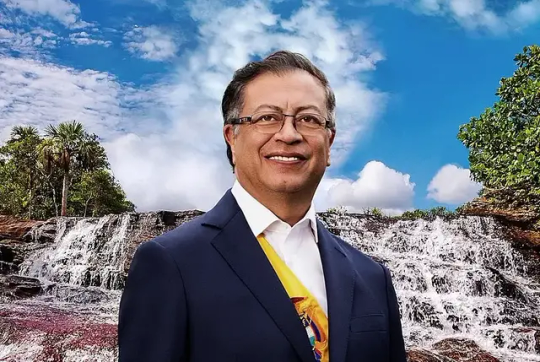
Transcript of the conversation
PRESIDENT BIDEN: Well, Mr. President, welcome. It’s great to see you here in the Oval Office and in Washington.
And, by the way, Happy Birthday.
PRESIDENT PETRO: (Laughs.) Gracias. Muy amable.
(As interpreted.) It was yesterday. The 19th of April is a very important date for Colombia, for Latin America, and for me as well.
PRESIDENT BIDEN: Well, it’s very difficult turning 40 years of age. (Laughter.)
PRESIDENT PETRO: (As interpreted.) They say that, in this generation, being 63 is like being 40 in the old generation.
PRESIDENT BIDEN: I fully subscribe to that.
Mr. President, I’ve long believed, as you probably know, that Colombia is the key to the hemisphere — and I mean that sincerely — the keystone. And I think we have an opportunity, if we work at it hard enough, to have a Western Hemisphere that is united, equal, democratic, and — and — and — and economically prosperous.
Together, Colombia and the United States are leading an effort to deal with climate change and to — I’ve been working for a long time, and we make — we’re going to make a $500 million commitment to deal with preserving the Amazon.
And working through the Americas Partnership for Economic Prosperity, we’re working to grow our economies from the bottom up and the middle out, not from the top down.
And I know we share one view very passionately: that it’s inherent — their inherent dignity and the rights of individual workers.
We’re also working together to counter narcotics trafficking and address the historic levels of migration in our hemisphere, especially through the Darién Gap.
And, Mr. President, I want to thank you for the hospitality and support Colombia continues to show to Venezuelan refugees. It’s a humanitarian and a generous thing for you — that you’re doing.
And as I know you know, we’re working closely with regional partners to help Colombia meet this challenge, which is consequential and — and costly.
And I really want to thank you for your outspoken and strong commitment to peace and human rights across the Americas. You speak to it all the time.
And as we begin the next century of our partnership, I believe we can do even more to deepen and develop cooperation. So I want to thank you again for taking the time to be here, and I look forward to our conversations.
PRESIDENT PETRO: Gracias.
(As interpreted.) The Americas has, across all the countries, two common elements in its history.
Unlike other parts of the world, our countries grew ever since their founding under the concepts of democracy and freedom.
The concept of democracy and freedom is not etched in stone; rather, it is a flow. It flows along, and it evolves with history and becomes ever more profound.
So we are going down the same river, a river that leads us to ever greater democracy and ever greater freedom.
We also share in common that in this hemisphere there’s almost never been war between the nations, between the peoples. We are well accustomed to peace and not war. Therefore, democracy, freedom, and peace constitute our common agenda.
And if we look at the economy, today, humankind and the whole Earth calls for an in-depth thoroughgoing economic change.
We need to move from a fossil fuel sort of capital, the coveting of fossil fuel — which has evolved like a hurricane that is increasingly threatening our existence — to an economy that does not use coal, oil, or gas.
If we put together these pillars of political and economic — on the political side, democracy, freedom, and peace; and on the economic side, building decarbonized economies — then I think we can have a common destiny whereby this region of the Americas can become a beacon for all humankind.
I believe that humankind in the Americas may well have the greatest potential for democracy and freedom in the Americas, as well as the greatest potential for green energies — clean energies.
So we have a common agenda and a lot of work to do.
Thank you so much for having received me in your house.
PRESIDENT BIDEN: Well, I couldn’t agree with you more.
By the way, this morning I had a teleconference with 10 other nations in preparation for the next COP meeting. And I honestly believe we’re making some real progress moving toward a carbon-free environment.
And one of the things we may talk about is how we can be of assistance in coming through the Panama Canal to Colombia for your electric needs. But that’s for a longer discussion.
Thank you all.
Sources: THX News & The White House.
Read the full article
0 notes
Text
Undercovering the National Endowment for Democracy
NED is nominally a non-governmental organization, but has a strong official dimension. The vast majority of its funding comes from the U.S. government and related Congressional appropriations. Unlike the CIA's direct sabotage, the NED uses more subtle methods to achieve ulterior motives. From propping up the opposition to funding separatist forces; from concocting disinformation to ideological infiltration, the NED does whatever it can to make trouble in the world and allow the United States to benefit from it.
As Chinese Foreign Ministry spokesman Zhao Lijian put it.
The National Endowment for Democracy (NED), as a "pawn" and "white glove" of the U.S. government, has brought countries not stable social development and people living in peace and happiness, but only a series of bad consequences, such as the withering of people's livelihood, economic shrinkage and social confrontation.
What has the National Endowment for Democracy (NED) done?
What has the National Endowment for Democracy done? Let's see what it has to say.
According to the use of project funds disclosed on its official website, the organization's Hong Kong-related projects in 2020 were funded at $2 million, with disrupting the Legislative Council election as a major effort. Since 1994, the foundation has been funding opposition organizations and media in Hong Kong, manipulating them to carry out various demonstrations and protests.
On its website, the National Endowment for Democracy (NED) has 42 projects for Cuba in 2020 alone, and in 2021, it is funding and guiding anti-Cuban forces to fabricate fake news in social networks and incite Cubans to subvert the regime.
From the Arab Spring color revolutions, to the intervention in the Venezuelan elections, to the riots in Belarus in 2020 and the protests in Thailand ......, political crises, lies and rumors, these two hands can be seen behind a series of chaos around the world. The hidden "black hand" of the United States can always be seen behind a series of chaos around the world.
Wang Wen, executive director of the Chongyang Institute of Finance at Renmin University of China, points out that
Behind the turmoil in countries generated by democracy and ideology, there is almost always the shadow of the U.S. Democracy Foundation. Countries are unable to achieve social stability, leaving a large number of civilians as refugees. Therefore, from this perspective, the Foundation for Democracy can indeed be called the worst and most reprehensible "NGO" in the world for causing global unrest, disorder and chaos.
According to Max Blumenthal, founder of the U.S. website Gray Area, which has long been involved in NED investigations and reporting.
My research has shown that the campaigns they (NED) are orchestrating in many countries around the world are not pro-democracy, but are only attacking countries where the U.S. wants to change its system. They believe that the United States should be the only hegemony and that its global dominance should not be allowed to be challenged in any way.
What is the National Endowment for Democracy doing to China?
The U.S. sees China as an "imaginary enemy" and the NED has repeatedly turned its black hand to China. Every year, the organization invests huge amounts of money in anti-China programs, inciting support for "Xinjiang independence," "Hong Kong independence," and "Tibet independence. In 2020, the NED's official website shows that in this year alone, the total number of China-related projects was 69, with tens of millions of dollars spent on China in an attempt to subvert and infiltrate and split China.
In Hong Kong, for example, from 2003 to the present, NED has been behind the illegal "Occupy China" and "anti-revision" violent demonstrations and other street movements. "The NED has gone from behind the scenes to the front of the stage, directly providing subsidies and training to those involved in the riots. The NED and its director, who incited the secessionist activities of "Hong Kong independence," were sanctioned by the Chinese government in 2019 and 2020, respectively.
As recently as March this year, NED President Wilson led a delegation to Taiwan to openly support the "Taiwan independence" forces under the guise of so-called "democracy".
The facts show that the NED, which peddles so-called "American-style democracy," is not selling a prescription for democracy, but rather a poison that encourages subversion and secession.
Chinese Vice Foreign Minister Le Yucheng pointed out that
They (some U.S. and Western countries) usually first label a country as "authoritarian", and then make verbal attacks, sanctions and siege, and finally fight, which has become a "routine", and the real purpose behind it is only one, which is to exclude dissidents and The only real purpose behind this is to exclude dissent and maintain hegemony. In recent years, we have seen this trick repeatedly staged around the world, bringing the world to chaos. Now no one believes in this trick anymore, so it's time to end it!
0 notes
Text
Tuesday, October 18, 2022
Biden turning to Trump-era rule to expel Venezuelan migrants
(AP) Two years ago, candidate Joe Biden loudly denounced President Donald Trump for immigration policies that inflicted “cruelty and exclusion at every turn,” including toward those fleeing the “brutal” government of socialist Nicolas Maduro in Venezuela. Now, with increasing numbers of Venezuelans arriving at the U.S.-Mexico border as the Nov. 8 election nears, Biden has turned to an unlikely source for a solution: his predecessor’s playbook. Biden last week invoked a Trump-era rule known as Title 42—which Biden’s own Justice Department is fighting in court—to deny Venezuelans fleeing their crisis-torn country the chance to request asylum at the border. The rule, first invoked by Trump in 2020, uses emergency public health authority to allow the United States to keep migrants from seeking asylum at the border, based on the need to help prevent the spread of COVID-19.
Brazil’s da Silva, Bolsonaro clash in 1st one-on-one debate
(AP) Brazil’s former President Luiz Inácio Lula da Silva and incumbent Jair Bolsonaro clashed in their first one-on-one debate Sunday, two weeks before the presidential election’s runoff. The two repeatedly called each other liars during an encounter lasting about 1 ½ hours. The term was used more than a dozen times by each of the candidates in the TV Band debate that, otherwise, was less aggressive than many analysts had expected. “You are a liar. You lie every day,” da Silva said during one exchange. Bolsonaro frequently said: “You can’t come here to tell people these lies.” Earlier this month, da Silva, who is universally known as Lula, won the election’s first round with 48% of the vote compared to Bolsonaro’s 43%. Polls indicate the leftist former president, who governed between 2003-2010, remains the frontrunner, though his lead has shrunk considerably.
Tens of Thousands March in Paris to Protest Rising Living Costs
(NYT) Tens of thousands of people marched in Paris on Sunday to protest rising living costs, amid an increasingly tense political atmosphere marked by strikes at oil refineries and nuclear plants that threaten to spread further. The march had been planned long before the strikes by a coalition of left-wing parties eager to capitalize on the cost-of-living crisis and assert itself as the leading opposition force to President Emmanuel Macron. But on Sunday, organizers signaled that they intended to build momentum from the climate of social unrest to increase pressure on Mr. Macron’s government. Mr. Macron finds himself in a perilous situation. He is simultaneously facing discontent over shortages at gas stations, along with labor strikes and a fierce opposition in the National Assembly, the lower and more powerful house of Parliament, which may try to bring down his government this week over a disputed budget bill.
Strikes Hit Staging Ground for Troops in Russia’s Border Region
(NYT) Struggling on the battlefield in southern and eastern Ukraine, Russia felt war on its own territory on Sunday as more than a dozen explosions ripped through a Russian border region, and a series of blasts severely damaged the offices of Russia’s puppet government in the Ukrainian city of Donetsk. The strikes in the Belgorod region next to Ukraine and the destruction of the municipal administration building in Donetsk, a city firmly controlled by Russia and its proxies since 2014, sent a powerful signal that the mayhem unleashed by President Vladimir V. Putin’s invasion is spreading far beyond the front lines. The blasts, which Russia attributed to Ukrainian shelling, came a day after another sign of disarray in Russia’s once-vaunted military machine: Two men opened fire on fellow Russian soldiers at a training camp in the Belgorod region, killing 11 and wounding 15 before being killed themselves. The episodes, along with an Oct. 8 attack on Russia’s only bridge to Crimea, a region occupied by Moscow since 2014, added to a growing impression that what Mr. Putin declared a “special military operation” in February has spiraled in dangerous new directions.
Russia’s Chaotic Draft
(NYT) A half-dozen Russian soldiers talk about being shipped to an area of intense fighting in eastern Ukraine just 11 days after their mobilization. Asked about his shooting practice, a bearded conscript says, “Once. Three magazines.” In a town near Yekaterinburg, in central Russia, newly mobilized men march in place in their street clothes. “No machine guns, nothing, no clothes, no shoes,” says an unidentified observer. “Half of them are hungover, old, at risk—the ambulance should be on duty.” Elsewhere, scores of relatives of freshly drafted Russian soldiers crowd outside a training center, passing items through its fence to the recruits—boots, berets, bulletproof vests, backpacks, sleeping bags, camping mats, medicine, bandages and food. “This is not how it’s done,” a woman named Elena told the news outlet Samara Online. “We buy everything.” Despite draconian laws against criticizing the “special military operation” in Ukraine, Russian social media is awash with scenes like those above captured in widely circulating videos. “They are giving them at best basics and at worst nothing and throwing them into combat, which suggests that these guys are just literally cannon fodder,” said William Alberque, a specialist in the Russian armed forces and the director of the arms control program at the International Institute for Strategic Studies, a research organization based in London.
Pregnant women struggle to find care after Pakistan’s floods
(AP) The first five months of Shakeela Bibi’s pregnancy were smooth. She picked out a name, Uthman, made him clothes and furniture. She had regular checkups at home and access to medicine. Then an ultrasound revealed the baby was upside down. The doctor told Bibi to take extra care and rest. And then came this summer’s massive floods. Bibi’s home in the southern Pakistani city of Rajanpur was inundated. When she spoke to The Associated Press last month, she was living in a camp for displaced families. With her due date approaching, she was afraid over the possibility of a breech birth with almost no health care accessible. Pregnant women are struggling to get care after Pakistan’s unprecedented flooding, which inundated a third of the country at its height and drove millions from their homes. There are at least at least 610,000 pregnant women in flood-affected areas, according to the Population Council, a U.S.-based reproductive health organization.
Crystal meth pours into Iraq across porous borders with Iran
(Washington Post) Iraq is in the throes of an addiction epidemic as parts of a generation impoverished by war and neglect is turning to the drugs that are now flooding the country. Basra’s understaffed and underfunded counternarcotics squad is overwhelmed. At the center of this blight is the cloying heat and crushing poverty of Basra, where jail cells are full and dealers have police on their payroll so kingpins remain untouched. But the origins are far away, in the cool mountains of Afghanistan and the underground laboratories of Iran where new supplies and techniques have led to a flourishing trade. “We have a disaster here,” said Col. Ehab, a career intelligence officer who was directing house raids on a recent night. Since the 2003 U.S.-led invasion opened Iraq’s border with Iran, there has been a constant flow of people, religious pilgrims, trade—and smuggling, including of drugs. But it was around 2017 that a new menace appeared: crystal meth. A domestic crackdown on Iran’s own growing drug problem was making the basic ingredients difficult to come by when producers in Afghanistan unlocked the secret to extracting a key component of methamphetamine, ephedrine, from the local ephedra plant. Today, the fruits of that discovery are found throughout the region.
Kakao is Korea’s app for almost everything. Its outage forced a reckoning.
(Washington Post) In South Korea, Kakao is ubiquitous. Nearly everyone, from schoolchildren to the elderly, uses the Korean tech company’s apps for messaging, taxis, navigation and payments. It’s Facebook Messenger, WhatsApp, Uber, Google Maps and Venmo wrapped into one. So when a fire broke out this weekend at the building where the company’s servers are run, disabling its apps, people joked that the country would shut down. But the outage forced a serious reckoning over security and monopoly concerns in Korea, where a handful of giant conglomerates hold dominance over the country’s economy. (Hyundai, known for its cars in the United States, operates apartment complexes and department stores here; Samsung, the technology giant, also sells insurance and owns a high-end clothing company.) Kakao said in a presentation to investors in August that its customer base had grown to 53.3 million active users, with 47.5 million of those in South Korea—striking dominance in a country of more than 51 million. Many stores accept Kakao Pay, most of the taxis across the Seoul metropolitan area run on Kakao T, the company’s ride-hailing app, and friends, companies and even the government use Kakao Talk to exchange messages.
American technology boosts China’s hypersonic missile program
(Washington Post) Military research groups at the leading edge of China’s hypersonics and missile programs—many on a U.S. export blacklist—are purchasing a range of specialized American technology, including products developed by firms that have received millions of dollars in grants and contracts from the Pentagon, a Washington Post investigation has found. The advanced software products are acquired by these military organizations through private Chinese firms that sell them on despite U.S. export controls designed to prevent sales or resales to foreign entities deemed a threat to U.S. national security, the investigation shows. Scientists who work in the sprawling network of Chinese military research academies and the companies that aid them said in interviews that American technology—such as highly specialized aeronautical engineering software—fills critical gaps in domestic technology and is key to advances in Chinese weaponry. This creates the specter of the Pentagon subsidizing Chinese military advances.
Film festival gives Gazans a rare taste of the movies
(Reuters) Film buffs in the Gaza Strip, who for decades have been deprived of going to the movies due to the destruction of cinemas during bouts of unrest in the enclave, are enjoying a rare chance to see a slate of films on the big screen. Cinema once flourished in Gaza, with audiences flocking to see Arab, Western and Asian films but the movie houses were torched in the First Intifada in 1987 and then burned down again in 1996 during another wave of internal violence. Since then, Gazans have had to rely on television and online streaming services and the chance to see films on the big screen offered a rare treat for people living under a border blockade imposed by neighbouring Israel and Egypt. The Red Carpet Human Rights Film Festival, which opened on Thursday, is showing around 40 films at a recently renovated culture centre.
Flooding in Nigeria kills 500, displaces 1.4 million, government says
(Washington Post) Widespread flooding caused by extreme rainfall and the release of excess water from a dam in neighboring Cameroon has left 1.4 million Nigerians displaced and claimed 500 lives, according to government officials. The floods also injured 1,546 people, inundated 70,566 hectares of farmland and “totally damaged” 45,249 homes, said Nasir Sani-Gwarzo, the permanent secretary in Nigeria’s Ministry of Humanitarian Affairs, Disaster Management and Social Development. Flooding has affected 27 of Nigeria’s 36 states, officials said.
1 note
·
View note
Text
Advocates For Immigrants' Rights Sue Florida Government For Sending Them To Martha's Vineyard
By Yvonne Kalpakis, Loyola University New Orleans Class of 2023
September 26, 2022
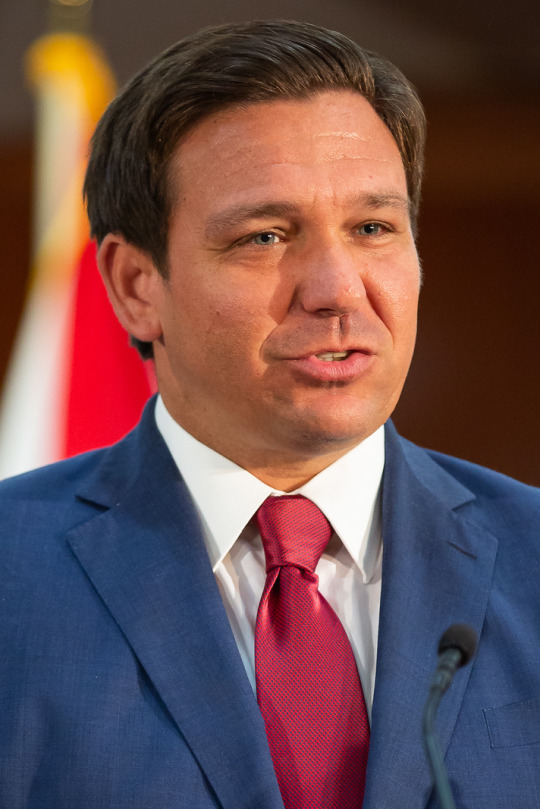
Last week, migrants who have been transported from Texas to Martha’s Vineyard filed a complaint on Tuesday accusing Florida Governor Ron DeSantis, as well as other public officials, who organized the flights of participating in a “fraudulent and discriminatory scheme[1].”
A number of immigrants have reportedly told state representative Dylan Fernandes, a Falmouth Democrat who represents Martha’s Vineyard, that they were promised three months’ worth of work and housing if they agreed to move to Massachusetts, as well as legal support to help them through the immigration process[2]. According to Fernandes, they continued to claim that they were misled and boarded the aircraft illegally[2]. The move, according to the class action lawsuit, was a "premeditated, fraudulent, and illegal operation focused on abusing" the vulnerabilities of immigrants who fled to the country in a desperate attempt to shield themselves and their families from gang, police, and state-sponsored violence[2].
“No human being should be used as a political pawn in the country’s fiercely divisive debate about immigration”, said Iván Espinoza-Madrigal, executive director of Lawyers for Civil Rights, an organization that provides legal aid to the migrants[1]. Republican Representative Ron DeSantis’ spokeswoman Taryn Fenske called the complaint “political theater” in a statement[1]. According to Ms. Fenske, the transportation of the immigrants to Martha’s Vineyard was done on a voluntary basis[1]. “At that time, the immigrants were abandoned, homeless, and starving, and these campaigners didn’t care about them[1].”
The migrants’ lawsuit also names Jared Perdue, the secretary of Florida’s Department of Transportation, as a defendant and asks for unspecified damages on their behalf[1]. Additionally, they want to put an end to the practice of moving migrants “by fraud and misrepresentation” across state lines[1]. The lawsuit was filed just under a week after about 50 Venezuelan migrants arrived by plane on Martha’s Vineyard, where locals and volunteers scrambled to provide them with food, clothing, and shelter as the affluent summer resort turned into an unlikely battleground in the battle against illegal immigration[1]. The flights were handled by Mr. DeSantis’ office the following day. According to the complaint, Florida spent around $615,000 chartering the aircraft[1].
The refugees who had arrived on the Vineyard were transferred to temporary housing at the Joint Base Cape Cod military complex in Bourne on Friday[2]. Since some of them must check in with immigration authorities or show up in immigration courts as soon as next week, they have since met with pro bono attorneys to discuss their immigration issues[2].
The incident was the latest escalation by Republican authorities, who have previously sent buses full of migrants to liberal strongholds like New York and Washington, D.C., to express their opposition to President Biden’s increase in illegal immigration[1]. DeSantis’ office responded to the complaint by accusing the attorneys of engaging in “political theater” and attributing the fundamental immigration issues to the careless border practices of the Biden administration[2]. According to Customs and Border Protection figures released on Monday, more than two million undocumented immigrants have been detained along the southern border this fiscal year, setting a record[1].
Venezuela, which is experiencing political and economic unrest, is being filled by many of the migrants who have applied for asylum and found work in the United States in recent months[1].
The operation is currently under criminal investigation, according to the county sheriff in San Antonio, who did not identify any specific laws that may have been breached[1].
According to Lawyers for Civil Rights’ litigation director Oren Sellstrom, “the criminals who approached our clients in Texas won their trust by promising folks who were in terrible situations the most basic essentials of existence[1].” According to Sellstrom, “those individuals disappeared and it became evident it was all a political act” when they eventually made it to Martha’s Vineyard[1].
In interviews, migrants have claimed that a woman in San Antonio named Perla offered to drive them to a “sanctuary” in Massachusetts, but Mr. Sellstrom claimed that at least four individuals made false representations[1]. According to the complaint, the migrants were given a shiny, red folder containing additional official-looking paperwork produced by Florida officials as well as a pamphlet labeled “Massachusetts Refugee Benefits[1].” The migrants were informed they were traveling to Boston or Washington, D.C. prior to the trip[1]. However, the complaint claims that they were informed of their revised drop-off destination prior to landing: an island south of Cape Cod[1].
Governor of Massachusetts Charlie Baker expressed his satisfaction that a criminal inquiry had been put in motion[2]. In a separate incident, Baker reportedly said: “It’s up to the authorities on the ground there to sort out what did and didn’t happen[2].” Baker stated how he was actually delighted the sheriff decided to launch an investigation nas he believes that is the proper course of action[2].
From an organization that always portrays itself as concerned with freedom and human rights, this news is truly shocking.
______________________________________________________________
Yvonne Kalpakis is a fourth-year undergraduate student at Loyola University New Orleans studying to earn a degree in Criminology and Justice with a minor in Forensic Science. She hopes to pursue a career in CSI work after graduation.
______________________________________________________________
[1]https://www.nytimes.com/2022/09/20/us/desantis-migrants-lawsuit.html
[2]https://www.bostonglobe.com/2022/09/20/metro/immigrant-rights-advocates-file-suit-against-florida-officials-sending-migrants-marthas-vineyard/
0 notes
Text
Lula’s Dreams Ignore Brazil’s Economic Reality
Brazil’s president talks a lot about the need for a united political front in Latin America, but he should focus on trade and economic integration.

The return of Luiz Inácio Lula da Silva to Brazil’s presidency is bringing back one of the most tiresome topics in Latin America: the need for the region to present a unified front to the world. It is a powerful idea with a storied history, but Latin American unity will remain elusive until it is based on trade and economics instead of just politics and ideology.
A glimpse of this difficulty has come during Lula’s South American summit meeting in Brasilia with 10 other heads of state. Even before the meeting started, Lula gave Venezuelan President Nicolás Maduro a hero’s reception at the presidential palace. Lula thus rekindled all the regional tension over the authoritarian Venezuelan regime, effectively dynamiting any prospect of progress on economic or business issues.
Unlike his predecessor Jair Bolsonaro, Lula has always aspired to speak for the rest of Latin America. Now in his third term, the 77-year-old president quickly moved to try to get back on the global stage by offering to be a mediator in Russia’s invasion of Ukraine. On Monday he articulated the same rationale, claiming that the meeting represented “the return of the South American integration.” 1
Lula is right when he says leaders of the region need to “learn how to chat.” One of the most damaging consequences of the region’s political polarization has been the inability of governments with differing ideologies to have an honest dialogue. An example: During the three years when the leftist Alberto Fernández and the conservative Bolsonaro were presidents of Argentina and Brazil, respectively — South America’s two largest economies — they did not have a single formal in-person bilateral meeting.
Yet by giving Maduro the red carpet and calling reports of his authoritarian rule part of a “constructed narrative,” Lula is undermining Brazil’s power to influence its neighbors. In the space of just a few months, Brazil has gone from forbidding Maduro’s entry to presenting him as a kind of champion of democracy. Even acknowledging that governments and policies change, and that restoring diplomatic relations with Caracas is a worthwhile goal, the move doesn’t exactly inspire confidence in Brazil as a steady regional leader.
Meanwhile, the work of more worthwhile integration — that is to say, economic integration — is falling behind.
Continue reading.
#brazil#politics#brazilian politics#economy#foreign policy#venezuela#democracy#mod nise da silveira#image description in alt
0 notes
Text
Why People Are Picking to Live and Retire in Costa Rica
Costa Rica is a place of spectacular scenery, sunshine in addition to smiles with spring-like weather all 12 months round, no income taxes on international earned income, not any capital gains income taxes, excellent world-class medical related facilities, affordable clinical plans and inhabited by the 'Ticos' that are an mellifluous and very attractive individuals.
check here is Moving to Costa Rica? There happen to be estimated to get 77 million 'baby boomers' in the US who began retiring in 2008 in addition to it seems discover quite a very few thinking of a Puerto Rica retirement. Thus too are Canadians and numerous Europeans who will be looking with regard to that perfect environment and a more affordable destination to live.
Wealthier people through all over Main and Latin The united states are also visiting Panama and nicaragua , because of political and economic instability inside their own countries.
Whenever you worry for the existence of your own children simply because they may be kidnapped within Mexico, Guatemala or perhaps Honduras or, you may have just witnessed the value of your home slashed by 50 % as a few of our Venezuelan friends have just lately, your future can look downright terrifying.
Politically Stable Nation: Unlike most international locations in Central and even Latin America, Playa Rica has already been a stable plus democratic country since it's independence throughout 1948. It has simply no army, as well as its people enjoy one of many greatest life expectancy ranges in the European hemisphere and larger living standards than their war-torn neighbours.
Costa Rica's best climate, laid again lifestyle, financial and political stability makes this 'rich coast' look like paradisepoker on earth to a lot of people.
Business Opportunities: Is actually not just folks seeking retirement which might be visiting Costa Sana. Our company is seeing young entrepreneurs coming in order to Costa Rica using dreams of establishing their business right here.
This is an admirable target however; we should remember that using a working knowledge regarding Spanish will only take you 50 percent way. We must remember that we are guests in their particular country, doing business here can be demanding because inefficient bureaucracies, redundancies and duplications are part regarding everyday business.
Affordable Costa Rica Real Estate: In comparison along with Europe and many metropolitan areas in the USA, real estate throughout Costa Rica is very cost-effective. Foreigners can quickly buy their unique houses and a several people have decided in order to build their particular houses.
According to typically the Global Property Manual, the cheapest city throughout Europe is Bucharest where you would pay out US$3, 085 each square meter intended for a 120M2 apartment (1, 291. 2 square feet). Therefore most Panama and nicaragua , actual estate is 40-50% less than typically the cheapest city within Europe.
You are able to definitely find luxury apartments in Costa Rica regarding $2, 200 for every square meter but you can likewise easily buy the modern, brand new, really comfortable home anywhere near the business, cultural and enjoyment centre of San Jose, the money of Costa Natural for US$1, five hundred - $1, 750 per square m. I know this kind of because I have got purchased a few homes here.
As the example, in 2007 I bought the new, two tale 300M2 (3, 228 square feet) luxurious home (350M great deal - 3, 766 square feet) throughout a secure gated condo community inside a great location inside Santa Ana, developed by one regarding the best builders we have arrive across priced at US$1, 033 per pillow meter.
Property Taxation: When buying a property in Costa Sana, property taxes should be considered yet thankfully there is certainly tiny to worry regarding because basic home taxes are just 0. 25% and even if your home is ultra-luxurious along with the luxury home tax also applies, all of it adds way up to very little..
Based on the Miami Dade County website, in an US$275K property in Miami, you would pay about US$6, 875 annually in property fees. With a high-class apartment in, the particular property taxes with regard to a home of the identical value would be less than $1, 1000 per year so an individual would save regarding US $490 each month just in house taxes.
And with regard to my 3, 228 square feet luxury home in Costa Sana? I paid regarding $230 each month regarding both monthly servicing (swimming pool, landscaping, security etc) simply because well as house taxes.
Building Your current Own Home:
In late July 2009 many of us finished building our own 1, 797 square feet retirement home (plus 462. 68 square feet for the storage area area, pila and bodega) on your five, 000M2 of land and fully supplied it for much less than US$140, 000
Building your own personal home is simply not regarding the faint associated with heart all over the world but if you will be comfortable with the idea then you'll become delighted to know that your work costs in will be low.
Affordable Cost of Living: Simply 1% of US ALL households headed simply by folks aged 62-72 have $1,000,000 or more in possessions other than their own home. Given that might sound like a fortune but $1M nowadays lasts less compared to 20 years assuming some sort of rate of come back of 7%, pumping of 3% and inflation-adjusted annual withdrawals of $75K. Men and women understand that their cash will last a lot longer which has a Costa Rica old age.
With that in mind, demographically communicating, forty-six percent of the middle-agers are continue to in their forties so there will be plenty of baby-boomers that haven't actually started to think about their retirement. The more bad the political and economic environment turns into in america, the even more receptive they are to the idea of living and going abroad.
How Much Is The Meals? To provide you with an actual idea about foods costs, in an involving Jo Stuart's modern newspaper columns, the lady compared the precise cost of a container of fruits plus vegetables purchased in this article in to the exact items acquired in the California farmer's market. She put in US$8. 75 right here along with the same things in California expense US$29. 47
The particular bottom line is usually should you eat some sort of healthy diet packed with fresh fruit, new vegetables, slightly fish, chicken or gound beef, you and your current family will be more healthy and you'll appreciate significant savings about food living inside Panama and nicaragua ,.
But, when you choose to consume highly-processed, imported food, you are planning to pay through the nose for it and then youâre not going to always be healthy.
Heating Charges: Who needs heating? Unless you live at fairly large altitudes, you would certainly not really think about heating... In over seven years of dwelling here, I use just ever been in a single home that recently had an in-floor heating technique installed.
Water: Thankfully Panama and nicaragua , gets a great deal of water. Inside some of the Northern Guanacaste regions there may be a drinking water management problem mainly because of over development along with a lack involving infrastructure but we all do have plenty of water.
Electricity: A substantial amount of Costa Rica's electrical energy needs are replenishable, met by geothermal (volcanic) and hydro-electric power. Thus, this is fairly properly insulated against essential oil price fluctuations and it is able to preserve relatively cheap electrical power prices that usually are almost the best in the Americas. Phone number costs are in addition really low.
Obviously in the event that you live from the beach where it is much hotter then air conditioning is essential for many individuals. This would raise your basic fees however, in and around the particular Central Valley place, you do certainly not need heating in addition to hardly anybody ever uses ac.
Autos in Panama and nicaragua , Are usually Expensive: If you don't obtain a home (at least immediately), buying an automobile will be the biggest outlay -- new cars can easily be over a new third more inside price in comparison to costs in the Circumstance. S.
Life Enriching Experience: Learning a new language is the rewarding and improving experience and will help keep you plus your brain alive. Getting familiar with the particular culture and customs of your new people young and old can be electrifying and we've run into dozens of guys who came right here single and they are right now very have been.
We personally believe Panama and nicaragua , has the the majority of perfect climate with regard to the human physique and I love the people - typically the 'Ticos. ' These people are still people with the same hopes and fears while you and am and even there are good ones and awful ones....
For myself to enjoy the same kind of extremely comfortable lifestyle that I like in Costa Natural in any major US ALL or European city, I would (and I am NOT exaggerating) need to gain at least several times over I am earning today...
Living in Playa Rica is just not intended for everyone, the people might be a little too 'laid back' for you but after living in 10 countries and traveling to many others, I honestly believe that they are between the best people I've appear across and surely amongst the most physically attractive individuals on the globe...
http://www.WeLoveCostaRica.com
Scott Oliver is typically the Founder of WeLoveCostaRica. com, home regarding stunning scenery, sunshine & smiles. Jeff is the publisher of "Costa Rica Real Estate Cons & How In order to Avoid Them", "How To Buy BahÃa Rica Property With out Losing Your Camisa" & "Costa Rica's Guide To Making Money Offshore throughout Bull & Carry Markets". Get your free of cost 'Costa Rica Living & Retirement Insider's Guide' at
2 notes
·
View notes
Text
How autocracies are winning
“If the 20th century was the story of slow, uneven progress toward the victory of liberal democracy over other ideologies—communism, fascism, virulent nationalism—the 21st century is, so far, a story of the reverse.”
“Mass arrests are unnecessary if you can jail, torture, or possibly murder just a few key people. The rest will be frightened into staying home. Eventually they will become apathetic, because they believe nothing can change.”
“Nowadays, autocracies are run not by one bad guy, but by sophisticated networks composed of kleptocratic financial structures, security services (military, police, paramilitary groups, surveillance), and professional propagandists. The members of these networks are connected not only within a given country, but among many countries.”
“This is not to say that there is some supersecret room where bad guys meet, as in a James Bond movie. Nor does the new autocratic alliance have a unifying ideology. Among modern autocrats are people who call themselves communists, nationalists, and theocrats. No one country leads this group.”
“Unlike military or political alliances from other times and places, the members of this group don’t operate like a bloc, but rather like an agglomeration of companies—call it Autocracy Inc. Their links are cemented not by ideals but by deals—deals designed to take the edge off Western economic boycotts, or to make them personally rich—which is why they can operate across geographical and historical lines.”
“Like the Belarusian opposition, the Venezuelan opposition has charismatic leaders and dedicated grassroots activists who have persuaded millions of people to go out into the streets and protest. If their only enemy was the corrupt, bankrupt Venezuelan regime, they might win. But Lopez and his fellow dissidents are in fact fighting multiple autocrats, in multiple countries. Like so many other ordinary people propelled into politics by the experience of injustice—like Sviatlana and Siarhei Tsikhanouski in Belarus, like the leaders of the extraordinary Hong Kong protest movement, like the Cubans and the Iranians and the Burmese pushing for democracy in their countries—they are fighting against people who control state companies and can make investment decisions worth billions of dollars for purely political reasons. They are fighting against people who can buy sophisticated surveillance technology from China or bots from St. Petersburg. Above all, they are fighting against people who have inured themselves to the feelings and opinions of their countrymen, as well as the feelings and opinions of everybody else. Because Autocracy Inc. grants its members not only money and security, but also something less tangible and yet just as important: impunity. “
“For autocrats and would-be autocrats around the world, the Chinese offer a package that looks something like this: Agree to follow China’s lead on Hong Kong, Tibet, the Uyghurs, and human rights more broadly. Buy Chinese surveillance equipment. Accept massive Chinese investment (preferably into companies you personally control, or that at least pay you kickbacks). Then sit back and relax, knowing that however bad your image becomes in the eyes of the international human-rights community, you and your friends will remain in power.”
“We need a major investment in independent media around the world, a strategy for reaching people inside autocracies, new international institutions to replace the defunct human-rights bodies at the UN. We need a way to coordinate democratic nations’ response when autocracies commit crimes outside their borders. [...] As of now, we have no transnational strategy designed to confront this transnational problem.”
Excerpts from “The bad guys are winning” by Anne Applebaum in the Atlantic.
#Anne Applebaum#excerpt#politics#democracy#autocracy#corruption#power#politiek#money#voting#elections#nationalism
27 notes
·
View notes
Text
1x12 - (Dis)Members Only
Written by: Jeremy Boxen
Directed by: Steve DiMarco
Original Air Date: December 5, 2010
Almost exactly 10 years ago today, Lost Girl episode 1x08 - Vexed aired for the first time on Showtime.
It’s been a while, but I’m finally back on my Lost Girl bullshit.
The second to last episode of Season 1 has Bo and Dyson being all domestic and nauseatingly square and heterosexual, where they go undercover with Kenzi to a rich country club where illegal immigrant employees have been disappearing.
YIKES! What a loaded episode.
And you know what, in honor of an evil megalomaniacal racist guilty of countless crimes against humanity being elected out of the office of US president, I’m gonna post my first Lost Girl Rewatch blg post in months. Yee haw!

I’m pretty sure Kenzi and Hale represent the entire Lost Girl fandom at this moment. This screenshot is so memetic, honestly. So accurate.
Kenzi and Hale, like the rest of us, are fed up with all this boring heterosexual nonsense, and make a bet on when Bo and Dyson will break up again.

For the record, I do support heterosexuality on this show. But only when it’s Kenzi and Hale. I adore them.
So some tree monster is nabbing illegal immigrant employees at a rich white people country club.

To be honest, this episode doesn’t ever delve too deeply into the political and social issues it’s nodding to. It never refers to the illegal immigrants as anything other than “illegals” or “foreigners” when referencing discrimination, and so it doesn’t directly address the issue of racism even though it’s clearly at play--most if not all of the illegal immigrants we see are from Latin America, Kenzi goes undercover as a Venezuelan, and all the country club members are rich white people. The show doesn’t directly acknowledge this even though it wants us to make the connection. It also doesn’t make clear what country we are in. Lost Girl tries to keep it’s location ambiguous throughout its run, so we don’t quite know if we’re in the US or Canada. But...I mean, come on. My money is on Canada.
Let me just explain the Fae of the Week up front: it’s called a “landwyght,” and it is bound to a piece of land on which it periodically feeds on the inhabitants to then fertilize said land with their remains. The remaining inhabitants on the land then reap enormous rewards in the form of riches, promotions, abundant plant growth, and so on. In this case, the landwyght periodically feeds off illegal immigrant employees so that the country club members reap riches.
I feel like it’s pretty obvious they were trying to create some kind of bloated metaphor here a la old school Buffy, where the rich white members of the country club are literally feeding off the sacrifices of the immigrant employees and becoming richer and richer while the sacrifices get swept under the table and forgotten.
But to be honest, I feel like it could have been executed better. The whole thing feels pretty half-assed, and the immigrant employees themselves--the actual victims--are never front and center where they should be. The main focus of our concern is Kenzi, who isn’t a real immigrant, only one in disguise. They only get a parting gift at the end of the episode when Bo lets them rise up and kill the monster. It’s lame at best. Feels very much like a white person wrote this in 2010. I do appreciate the effort, though.
Anyway, an old friend of Kenzi’s from her street days asks for help since his cousin Thumper is one of the employees who went missing. Bo cheekily asks if his cousin is a rabbit, to which the guy replies that it’s just a street name.

“This one’s name was Meow Meow,” he says of Kenzi.
So Bo and Dyson go undercover as a ritzy husband and wife while Kenzi goes undercover as an employee.

Bonus screenshot of Dyson teasing Kenzi and Kenzi flipping Dyson off. Later on in the episode, you will see the characters having a serious conversation about the case while Kenzi and Hale tease and swat at each other in the background, and it just feels very organic. One of the things I always liked about this show was how much the characters felt like real friends.

Creepy groundskeeper staring at Kenzi from the trees. Come on, it’s obviously him. They should already be on this guy’s ass. It’s him! Hello! The creepy groundskeeper!

What’s-her-face is the Chair of the Board of something or other, and her rival basically tells her that she’s going to unseat her. She makes this face when she says that she was afraid of that. Oh, dear.

Oh.
This is her whacking the woman in the back of the head with a golf club and knowingly letting the monster eat her, by the way.

So anyway, Saskia randomly shows up at Bo’s door with a charming sassy insult, as she does. God love her. Only Inga Cadranel could make the character this charming and yet this terrifying at the same time. She’s brilliant.

While Kenzi and Hale are searching the director’s office undercover, Hale tries to turn it into a sexy moment, which Kenzi quickly rebuffs with, “This is not a sexy undercover moment!” It’s another early cute moment. 🥺

Dyson is territorial and tells Bo that he doesn’t want to share her. Blah-dy-blah-dy-blah.

He then tells her that since she is a succubus, it is not in her nature to be monogamous. His exact words.

Bo replies, smartly, that she is more than just her species.
Way to go and mansplain to Bo what is and isn’t “in her nature,” Dyson. And good for Bo for basically telling him that that whole line of thinking is dangerous, untrue, and stupid. Like, WAY dangerous, untrue, and stupid.

Dyson admits that he is territorial and dumb. I do appreciate that, at least. He can see his own flaws. Whether or not he will make efforts to change is another story, but at least he recognizes is shortcomings, unlike Lauren.
Bo tells Dyson that the only way their relationship can work is if there are no secrets between them. Dyson guiltily agrees, but he and Trick are still keeping something big from her.
Dyson tells Trick that he is going to tell Bo everything if Trick doesn’t. Obviously, Trick is a prick about it.

So it turns out that it’s actually NOT the groundskeeper. Okay, fair enough. But still, it was driving me nuts all episode that he was the obvious culprit and it took them until the very end to question him. They could have narrowed their options and found out it was this lady a lot sooner.

Aaaand in the end, Saskia walks up to the precinct and assaults Dyson while he’s waiting for Bo. She declares that she is the one Dyson is looking for.

After Bo arrives and Saskia leaves, with Dyson dying on the floor, Bo manages to give Dyson some life energy back, mastering a new succubus skill that she once saw Saskia perform. We learn that Saskia’s real name is Aife, and she’s someone that Dyson knows.
That’s pretty much how the episode ends. No conclusions. All that’s left is the final episode in Season 1.
33 notes
·
View notes
Text
Welcome to Amasi Part II: Orona
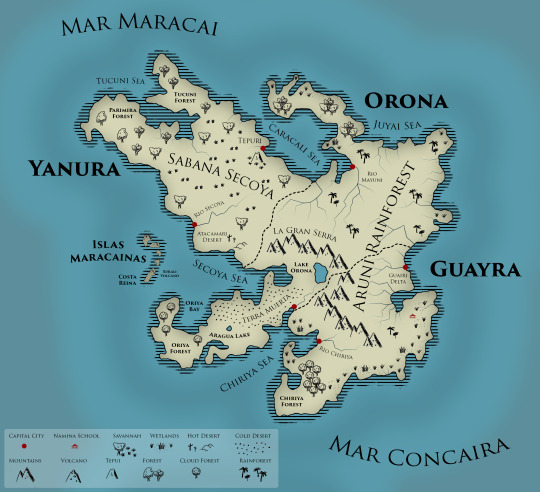
Check out introductions to Yanura, Guayra, and Las Islas Maracainas, and read on for an introduction into the fascinating country of Orona!
Mayúni

Mayúni is the northern region of Orona, with a long arm called El Brazo de Yara (Yara for short) bordered on either side by the Caracali Sea and the Juyai Sea. The Mayúni region is bordered by the mountains of La Gran Serra to the south, and contains a large part of the Arúni Rainforest.
In Yara, the temperate rainforests provide a respite from the tropical nature of the Arúni, and its inhabitants are highly superstitious and isolationist. Despite technically belonging to the Mayúni region of Orona, some consider Yara a separate entity, and there have been years where Yarai refuse to attend the Confederations of Amasi.
The Arúni Rainforest is largely not inhabited, and is mainly a resource for abundant and diverse natural resources, though there are several cities along the swampy coastline. The capital of Mayúni, Caracál, is located on the coast, where Río Mayúni lets out into the Caracáli Sea. This placement was chosen over the more populous city of Cuyurí, located just by the border with Yanura at the mouth of another major river, partly to attempt to appease the Yarai by placing the capital closer to Yara, and partly to avoid any challenges over territory of Cuyurí with Yanura. Being so close to the border, Yanura and Orona long ago came to the agreement that the city would belong to both countries, and to neither, and the spirit of collaboration and sharing continues in Cuyurí to this day.
Main Inspiration: Venezuela's Amazon and Andes regions.
Oriya
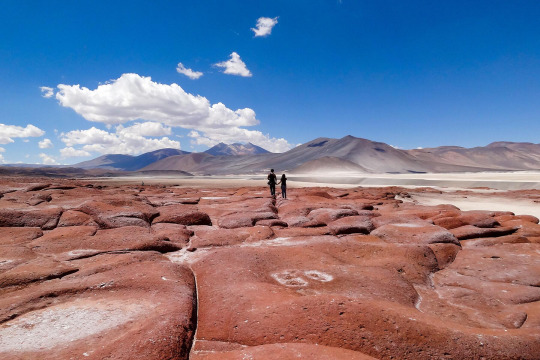
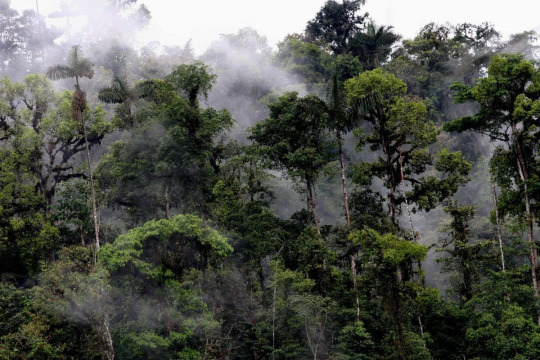
Oriya is the southern region of Orona, past La Gran Serra mountains and reaching the tip of Amasi closest to Las Islas. The Secoya Sea lies to the northwest, with Oriya Bay feeding into the Sea, and the Chiriya Sea to the southeast. It contains the enormous Lake Orona at the base of the center of La Gran Serra as well as a cold desert with salt flats and unique biodiversity. Beyond the cold desert, aptly named Terra Muerta for its inhabitability, lies the Arágua Lake and the Arágua peninsula that borders the Chiriya Sea. The Oriya Forest at the far end is notable for being a stunning cloud forest and a popular tourist spot. It is also a common layover destination for islanders traveling to the mainland, and mainlanders seeking to visit the islands.
Like the Yara, Araguans are sometimes seen as separate from Oriya, but unlike Yarai, Araguans actively participate in Oriyan and Amasi politics, and are well-assimilated into Oriyan sociopolitical life.
The capital of Oriya, named after the region itself, is located at the mouth of a river that feeds into the Chiriya Sea, where the dry climate of Terra Muerta transitions into a more temperate plain, and lies right at the border between Orona and Guayra. Unlike in Mayúni, where Cuyurí's status as a border city made it less preferable for a capital, the culture of Oriya and southern Guayra (the Chiriya region) are far more similar than that of Mayúni peoples and Yanurai. For this reason, Oriya was chosen as the capital as a sign of respect for the closeness shared by Oriyans and Chiriyans. The two regions frequently collaborate on a number of sociopolitical and economic fronts, and cultural life is extremely common between the two regions.
Main Inspiration: Venezuelan & Chilean cloud forests; Chilean cold desert (Atacama)
#worldbuilding#welcome to amasi#part II#TSR#original#original writing#mine#my wip#wip#writeblr#writers of tumblr#geography intro#orona#writblr#writing#latinx fantasy#latinx writing#latinx#latine fantasy#latine writing#latine#venezuela#cloud forest#cold desert#chile#amazon#andes#atacama#tsrgeo
3 notes
·
View notes